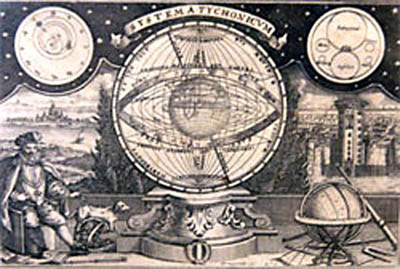| Astronomi

| | I 1572 observerer Tycho Brahe under et ophold hos sin morbroder Steen Bille på Herrevadskloster en ny stjerne i stjernebilledet Cassiopeia. Nu ved vi at der var tale om en såkaldt super nova, en hendøende stjerne.
Beskrivelsen af denne opdagelse bliver starten på Tycho Brahes berømmelse. Med tiden når Tycho Brahe også frem til et samlet verdensbillede, der dog ikke stemmer overens med Copernicus´. |
Nova Stella og det nye verdensbillede
Tycho Brahe studerer i udlandet og først i slutningen af 1570 vender han tilbage til Danmark og opholder sig tilsyneladende mest på Herrevad Kloster hos sin morbroder Steen Bille, der interesserede sig levende for kemiske og mekaniske eksperimenter.
Under et besøg der i november 1572 observerer Tycho Brahe, hvad han antager for at være en ny stjerne i stjernebilledet Cassiopeia og stærk tilskyndet, men noget imod sin vilje udgiver han en bog, "De Nova Stella", om den ny stjerne. Det var kontroversielt for en adelsmand at beskæftige sig med sådanne sager og den indledes da også med en række indlæg, der opregner argumenter for og imod en udgivelse.
Bogen, der trykkes i få eksemplarer i København, indeholder i manuskriptform tillige med afhandlingen om den nye stjerne en astrologisk og meteorologisk almanak for året 1573, samt en afhandling om en kommende måneformørkelse og afslutningsvis et digt til himmelguden Urania, alt sammen på latin. Umiddelbart kan det forekomme at være et besynderligt sammensurium af et skrift, men for Tycho Brahe er der indbyrdes forbindelser imellem disse beskæftigelser.

Nova Stella | 
Tycho Brahes verdensbillede | 
Verdensbillede |
Empirikeren Brahe
Måske er Tycho Brahe for beskeden med hensyn til rækkevidden af sine iagttagelser. Værkets astronomiske hovedærinde bliver gennem nøjagtige observationer at påvise mangler i den herskende opfattelse af det astronomiske verdensbillede. Ifølge dette er universet skabt på engang og der sker ikke ændringer uden Vorherres direkte indgriben.
Tycho Brahe vil ikke give sig af med at gisne om den bagvedliggende årsagssammenhæng, men bidrager her som i senere værker til en mere dynamisk opfattelse af det astronomiske verdensbillede. Tycho Brahes store fortjeneste livet igennem ligger i hans nøjagtige empiriske observationer og optegnelser, men bag dette også en erkendelse af at universet var uendeligt meget større end man antog og under stadig udvikling. I denne forstand var Tycho Brahe den første moderne astronom, men han vælger dog at imødegå Kopernikus nye verdensbillede, hvor solen og ikke jorden var universets centrum.

Tycho Brahes verdensbillede | 
Obeservationsscene | 
Sekstant | 
Himmelglobus |
Om Kometen
Da Tycho Brahe nogle år senere, på Hven i 1577, får lejlighed til at iagttage en komet udbygger han sine iagttagelser og konklusioner. I sit lille skrift "Om kometen", der er forfattet i 1578, men først udgivet med 350 års forsinkelse sammenfatter han sine iagttagelser over den ny stjerne og kometen.
Ligesom i værket om den ny stjerne anvendes også her en stor del af pladsen til astrologiske forudsigelser.
Astrologiens status
Tycho Brahe er imidlertid meget forsigtig i sin omgang med de astrologiske forudsigelser, hvilket han også præciserer i det efterfølgende:
"..skønt det er alle mennesker skjult at kende den rette grund til fremtidige ting, kan man dog fra de gamle erfarne astrologers observationer og lære få nogen anvisning på, hvad sådanne undere på himmelen kan udrette, hvilket lader sig gøre uden nogen som helst overtro(side 37-38)".
Når Tycho Brahe tager disse forbehold og må understrege sin afstandtagen til overtroen hænger det sammen med at astrologiens status også i samtiden var meget omdiskuteret, både blandt renæssancens tænkere og kirkens folk. Dog havde den en vis officiel status, som når f.eks. Tycho Brahe som en del af sine forpligtigelser overfor kongemagten lægger kronprinsens horoskop.
De astrologiske forudsigelser i samtiden deles op i to hovedgrupper: De meteorologiske og astrologiske. Udgangspunktet er nogle grundlæggende iagttagelser omkring planeternes indvirkning på livsbetingelserne, f.eks. det at solen afgiver varme og lys, at månen har indflydelse på tidevand, skiften imellem sommer og vinter osv. Den eksakte viden om disse forhold var naturligvis begrænset, men netop derfor kunne man jo også gøre sig forestillinger om disse forholds rækkevidde.

Christian IV´s horoskop |
Skaberens rolle
Som påpeget er Tycho Brahe meget forsigtig og forbeholden overfor astrologien og bliver det måske i stigende grad. Dog bliver han på intet tidspunkt fornægtende og det hænger sammen med at astrologien for ham indgår i en karakteristisk helhedstænkning.
I det hele taget er det interessante selve forholdet imellem de astronomiske og astrologiske overvejelser og universets skaber, altså Gud. Vorherre fremstår her som andre steder i skriftet som en bagvedliggende kraft, en almægtig igangsætter, hvis tilstedeværelse kan iagttages i naturens orden. Vorherre griber ikke straffende ind i begivenhedernes gang, men holder sig til de afgørende beslutninger omkring skaberværket og mennesket kan ikke tolke hans vilje i naturfænomenerne. I sin opfattelse af gudsbegrebet nærmer Tycho Brahe sig her en senere tids opfattelse.
Voksende anerkendelse
Tycho Brahes observationer vinder løbende anerkendelse og fra 1574 holder han, usædvanligt for sin stand, forelæsninger på universitetet. Senere får han tilbudt stillingen som rektor for universitetet, hvilket han takker nej til. Tilbuddet vidner dog om den bevågenhed han nyder, også hos kongemagten, og som bliver afgørende for hans udvikling i årene fremover. |